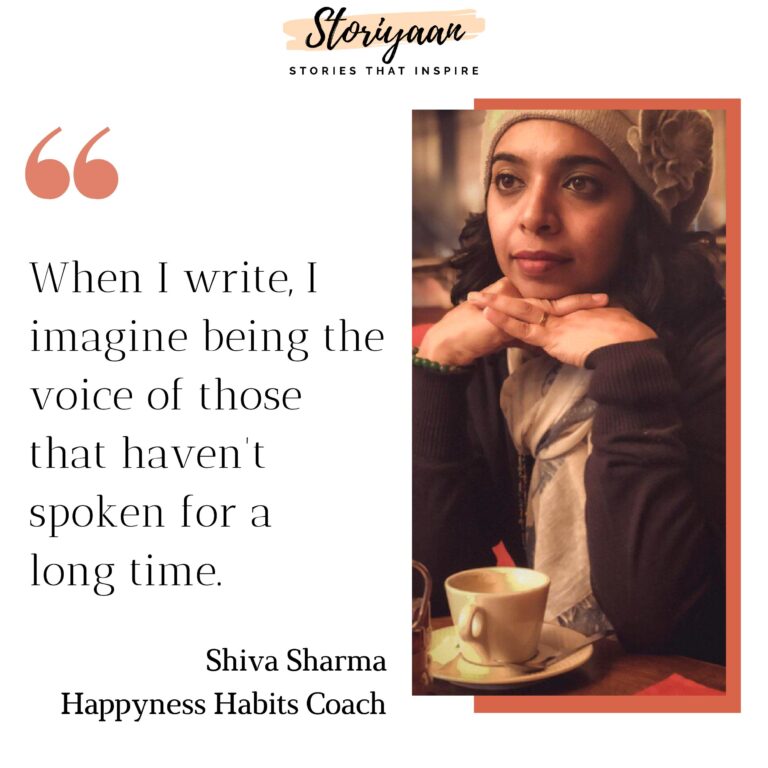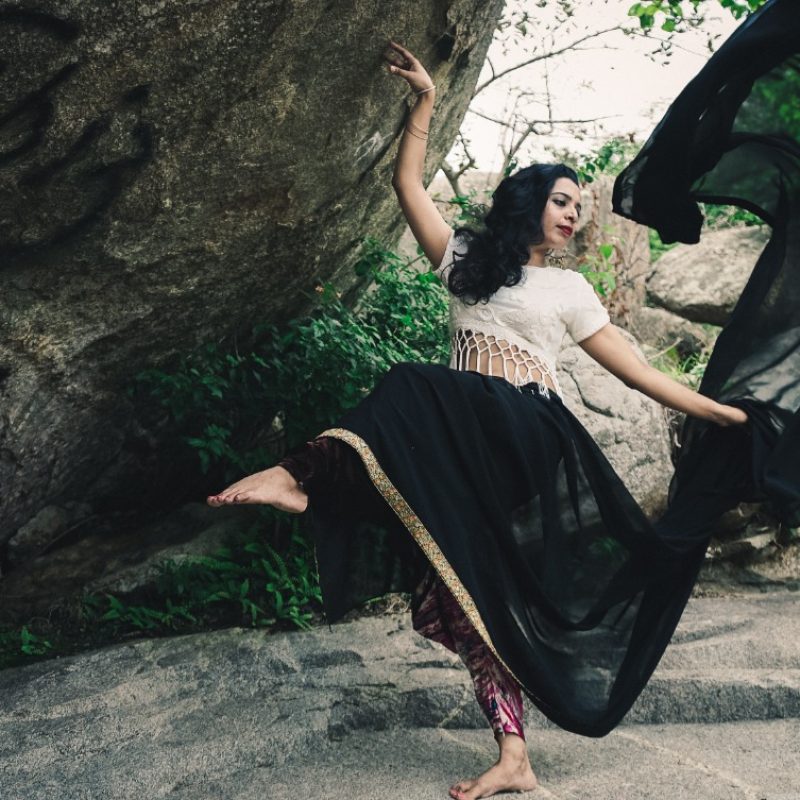Shiva Sharma is a restaurateur, a dancer, an activist, a happiness habits-coach and a mother. She has a dynamic personality and has been in the industry for 13 years living through a multitude of professions. A poet by passion Shiva integrates different aspects of her life and pens down her thoughts in a marvellous way.
In a conversation with Storiyaan, she speaks about radical self-love and motherhood in an unheard, unique and inspiring manner, showcasing her most candid self.

Shiva Sharma: A Conversation with the Conversationalist
Interview
Questions and answers
Self-love is often conceptualized both as a basic human necessity and a moral flaw akin to vanity. Where do you draw the line between the two?
While vanity comes from a place of ego and perfectionism, self-love comes from a place of warmth. Self-love does not believe in being perfect or being in a certain way; rather, it requires one to let go, surrender and accept themselves even their flaws.
How do you think the coronavirus and the lockdown have augmented the necessity for Radical self-love?
The world witnessed unprecedented hardships in the last few months. All our plans and previous notions about life were thrown away. Being at home cut us off from human socialization. Anxiety triggered old wounds and made us lonely. At times like these, it is even more important that we constantly check on ourselves rather than being too hard and beat ourselves up over things. We were away from human conversations and the company of those we value. This is where Radical self-love comes into the picture because we only have ourselves to count on and survive.
As an activist, what is the one change you believe is the need of the hour in the country?
I’ve been doing my bit backstage, and I absolutely believe that the one thing our country needs right now is a deep sense of empathy. We all coexist, we are co-dependent; we are a community. The only way a community grows and survives is not by being intolerable, but by being accepting of those around us. We have to start learning to empathise instead of shaming each other for our choices.
To what extent does your love for nature and travel translate into your style of writing?
I grew up travelling as my father had a job which transferred him to various places all the time. We moved from big cities to small ones. One thing that struck me was that no matter where we went, all people were the same. We had the same problems and shared the same issues. We all shared the feelings of hope and longed to be loved and appreciated. I was truly blessed to have a family that exposed me to art, music and writing at an early age. When I write, all my experiences are translated into the stories of people I’ve met, places I’ve seen and stories I’ve lived.
Can you elaborate some more on the line, "kis shor sharabe ki baat karte ho, yaha to barso se jang ka mahaul hai"?
When I write, I imagine being the voice of those that haven’t spoken for a long time. I write from the viewpoint of the marginalized and ignored, who come out on the streets to protest, but instead of being heard, are battered and tortured. Their protest is called noise, but in fact, so many of them have been at war for such a long time; fighting for their rights, their rightful place and a life of dignity.
What were the initial difficulties faced by you as a newbie restaurateur?
Being a restaurateur was my first entrepreneurial venture; everything was new and challenging. I was under the impression that if I put myself out there, there is absolutely no room for error. However, mistakes happen; customers may get unhappy. You have to improve and learn from your mistakes. Another important point to note is that managing employees isn’t easy. People have different needs, and they come from different walks of life. It is integral to keep track of everything and work with a team that can do the job effectively. We learnt this the hard way.
How do you connect your multitude of professions with one another?
I worked across a plethora of industries. From an NGO to a restaurateur, I’ve done it all. In my last 13 years of experience, I have learnt that communication is the key. It was present at the centre of my writing, through my dance, while interacting with customers, etc. We need to connect with people and communicate with them. This is the one lesson that has remained constant across the various professions that I’ve practised.
How has the journey of being a mother affected your perspective of self-love?
Being a mother is a tough job. Your identity is lost because you’re a mother now; suddenly, everything changes. Physically still healing, emotionally all over the place. We don’t talk about the struggles of a mother, because society assumes that she is ecstatic after just becoming a mother, but that’s not the case always. One also learns a lot of beautiful things during this phase of their life.
Being a mother of a 5-month-old, I am constantly learning to let go and to be forgiving towards myself and others. The more I hold on to the hate and bitterness, the more it affects me as a person, and I do not wish to be a parent who projects that bitterness on their child. That’s not the kind of mother I want to be.
Can you explain what it means to be an LGBTQIA+ ally since the term is relatively new in our society?
We all need that one friend who we can rely on and is there for you no matter what. For the LGBTQIA+ community, an ally is that friend. As an ally, we need to show up and be there, speak up, start a conversation, sensitize the workplace and our homes constantly. An ally also needs to be ever ready to learn and unlearn. We are the society, and it is up to bring about a transformation.
You have done some photography series celebrating acceptance and beauty. How did you come up with the idea to amalgamate the theme with the social issue of LGBTQIA+ acceptance?
If you look at social media, most of the time, it shows you a certain perfect picture of what someone should look like. When I did the photography series, I was privileged to work with some great people who featured in my series. My idea was to let beauty be expressed as it is; in every form – different sexual-orientations, different shapes and sizes. That was my intention behind the photography series, and I think the LGBTQIA+ representation in two of those series became very important because we need to hold a place for the community so that they have room to come out and express themselves.
Growing up, what do you believe was the key factor that influenced your life-choices and shaped you into the person you are today?
I grew up in a Brahmin family, and I have seen caste discrimination. I have also seen women not being given enough room to hold space for themselves, and I have witnessed the stigma around periods. Even when I was exposed to different places and cultures, my family was still very conservative. At each stage of my life, I started shedding all of these notions about people and society, how we should be and how we should not be. I think all of this has helped me grow as a person and has also helped me connect with people who care for me and love me.
A majority of the people, even today suffer from mental health issues, and one of the reasons has turned out to be the inability to "come out of the closet". How do you think we can teach the values of self-love and acceptance to a teenager who has merely reached adolescence and gender-awareness?
Teenage is such a vulnerable phase of our lives. I remember being bullied and laughed at by my classmates for looking different. This caused me to have low self-esteem as a teenager. Adding to this, there was no dialogue with my parents about it at home. I think it is necessary to create an environment at home where we have room for such conversations. As elders in the family, we must focus on making our children feel comfortable and free to talk about their sexuality, their emotional needs and their problems.
Mental health is of utmost importance. Jaan hai to Jahaan hai. My online courses on Radical Self Love, Miracle Mornings and Vision Board focus on healing, empowering, and expressing. A platform where we can talk, listen and support each other as a community.

